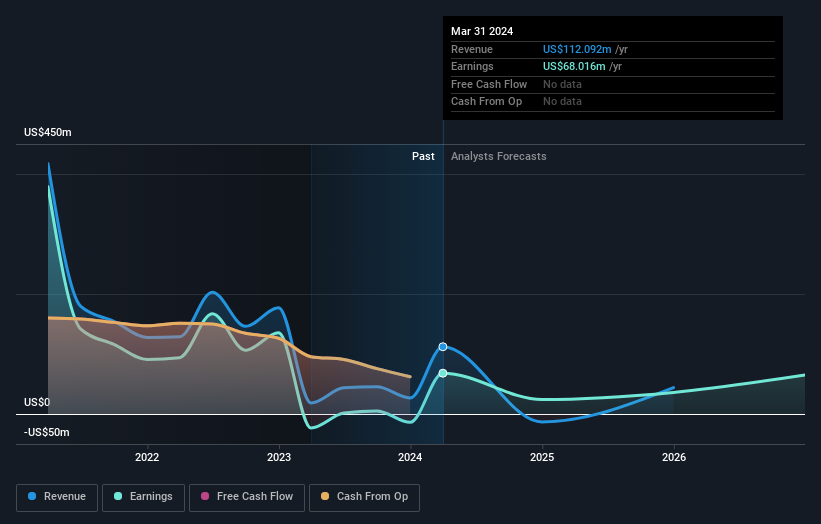- United States
- /
- Mortgage REITs
- /
- NYSE:DX
While institutions own 39% of Dynex Capital, Inc. (NYSE:DX), individual investors are its largest shareholders with 52% ownership

Key Insights
- The considerable ownership by individual investors in Dynex Capital indicates that they collectively have a greater say in management and business strategy
- 39% of the business is held by the top 25 shareholders
- Institutions own 39% of Dynex Capital
Every investor in Dynex Capital, Inc. (NYSE:DX) should be aware of the most powerful shareholder groups. And the group that holds the biggest piece of the pie are individual investors with 52% ownership. Put another way, the group faces the maximum upside potential (or downside risk).
Institutions, on the other hand, account for 39% of the company's stockholders. Generally speaking, as a company grows, institutions will increase their ownership. Conversely, insiders often decrease their ownership over time.
Let's delve deeper into each type of owner of Dynex Capital, beginning with the chart below.
View our latest analysis for Dynex Capital

What Does The Institutional Ownership Tell Us About Dynex Capital?
Institutions typically measure themselves against a benchmark when reporting to their own investors, so they often become more enthusiastic about a stock once it's included in a major index. We would expect most companies to have some institutions on the register, especially if they are growing.
As you can see, institutional investors have a fair amount of stake in Dynex Capital. This implies the analysts working for those institutions have looked at the stock and they like it. But just like anyone else, they could be wrong. When multiple institutions own a stock, there's always a risk that they are in a 'crowded trade'. When such a trade goes wrong, multiple parties may compete to sell stock fast. This risk is higher in a company without a history of growth. You can see Dynex Capital's historic earnings and revenue below, but keep in mind there's always more to the story.

Dynex Capital is not owned by hedge funds. BlackRock, Inc. is currently the company's largest shareholder with 10% of shares outstanding. For context, the second largest shareholder holds about 5.1% of the shares outstanding, followed by an ownership of 2.7% by the third-largest shareholder. In addition, we found that Byron Boston, the CEO has 0.7% of the shares allocated to their name.
Our studies suggest that the top 25 shareholders collectively control less than half of the company's shares, meaning that the company's shares are widely disseminated and there is no dominant shareholder.
Researching institutional ownership is a good way to gauge and filter a stock's expected performance. The same can be achieved by studying analyst sentiments. Quite a few analysts cover the stock, so you could look into forecast growth quite easily.
Insider Ownership Of Dynex Capital
The definition of an insider can differ slightly between different countries, but members of the board of directors always count. The company management answer to the board and the latter should represent the interests of shareholders. Notably, sometimes top-level managers are on the board themselves.
I generally consider insider ownership to be a good thing. However, on some occasions it makes it more difficult for other shareholders to hold the board accountable for decisions.
Our information suggests that Dynex Capital, Inc. insiders own under 1% of the company. It appears that the board holds about US$7.5m worth of stock. This compares to a market capitalization of US$759m. Many investors in smaller companies prefer to see the board more heavily invested. You can click here to see if those insiders have been buying or selling.
General Public Ownership
The general public -- including retail investors -- own 52% of Dynex Capital. With this amount of ownership, retail investors can collectively play a role in decisions that affect shareholder returns, such as dividend policies and the appointment of directors. They can also exercise the power to vote on acquisitions or mergers that may not improve profitability.
Next Steps:
I find it very interesting to look at who exactly owns a company. But to truly gain insight, we need to consider other information, too. Consider for instance, the ever-present spectre of investment risk. We've identified 4 warning signs with Dynex Capital (at least 3 which are a bit concerning) , and understanding them should be part of your investment process.
Ultimately the future is most important. You can access this free report on analyst forecasts for the company.
NB: Figures in this article are calculated using data from the last twelve months, which refer to the 12-month period ending on the last date of the month the financial statement is dated. This may not be consistent with full year annual report figures.
New: Manage All Your Stock Portfolios in One Place
We've created the ultimate portfolio companion for stock investors, and it's free.
• Connect an unlimited number of Portfolios and see your total in one currency
• Be alerted to new Warning Signs or Risks via email or mobile
• Track the Fair Value of your stocks
Have feedback on this article? Concerned about the content? Get in touch with us directly. Alternatively, email editorial-team (at) simplywallst.com.
This article by Simply Wall St is general in nature. We provide commentary based on historical data and analyst forecasts only using an unbiased methodology and our articles are not intended to be financial advice. It does not constitute a recommendation to buy or sell any stock, and does not take account of your objectives, or your financial situation. We aim to bring you long-term focused analysis driven by fundamental data. Note that our analysis may not factor in the latest price-sensitive company announcements or qualitative material. Simply Wall St has no position in any stocks mentioned.
About NYSE:DX
Dynex Capital
A mortgage real estate investment trust, invests in mortgage-backed securities (MBS) on a leveraged basis in the United States.
Solid track record with moderate growth potential.


